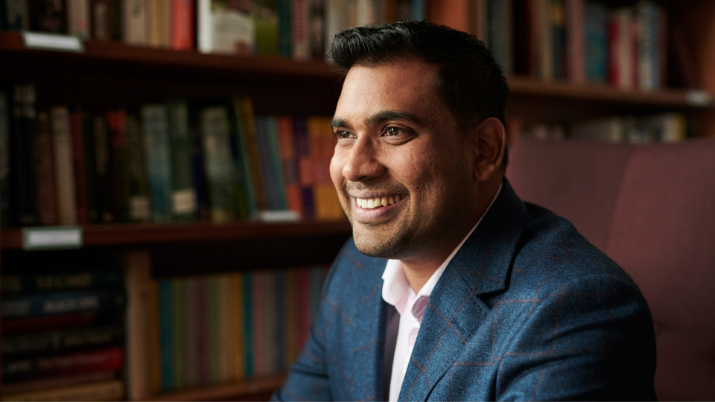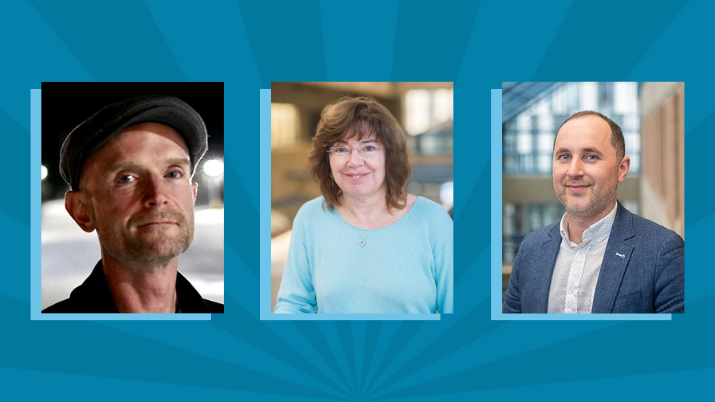Dr. Michael Muthukrishna’s (Ph. D ‘15) recent book A Theory of Everyone speaks volumes about his experience in the field of cultural evolution and public policy.
The UBC Psychology Alumna is now a professor at the London School of Economics (LSE) in the Department of Psychological and Behavioural Science with affiliations in the STICERD developmental economics group and the LSE Data Science Institute. He is also the co-founder of the UBC Database of Religious History, a board member at the One Pencil not-for-profit, and founder and director of LSE Culturalytik.
Dr. Muthukrishna is days away from launching his book, A Theory of Everyone: The New Science of Who We Are, How We Got Here, and Where We’re Going.
Playing on the phrase ‘a theory of everything’ from Physics, Dr. Muthukrishna’s ambitious, original, and deeply hopeful book A Theory of Everyone draws on the most recent research from across the sciences, humanities, and the emerging field of cultural evolution to paint a panoramic picture of who we are and what exactly makes human beings different from all other forms of life on the planet.
“A Theory of Everyone is a blueprint for a better future that offers a unified theory of human behavior, culture, and society.”
Dr. Muthukrishna argues that it is our unique ability to create culture, a shared body of knowledge, skills, and experience passed on from generation to generation, that has enabled our current dominance. But it is only by understanding and applying the laws of life—the need for energy, innovation, cooperation, and evolution—that we can solve the practical and existential challenges we face as a species. A Theory of Everyone attempts to provide solutions for the most pressing problems of our collective future, such as polarization, inequality, the great stagnation in productivity, and the energy crisis.
“I think of it as a complement to Yuval Harari’s Sapiens or Steven Pinker’s Better Angels of our Nature or an updated version of Jared Diamond’s Guns, Germs, and Steel.”
Casting a bold and wide net, Dr. Muthukrishna’s book is a must-read for anyone interested in a better future for ourselves and for generations to come. If you’re interested in reading the book, A Theory of Everyone will be released in Canada on October 31st.
Read our Q&A with Dr. Muthukrishna on his experience studying psychology at UBC, his primpary inspirations, how his degree fuels his research interests, and more.
Why did you choose to study psychology at UBC?
There’s a long story to this question that I discuss in my book, A Theory of Everyone: The New Science of Who We Are, How We Got Here, and Where We’re Going, but the short version is that I believed that we needed a formal science of norms and culture to tackle some of the challenges we would face in a climate-changed world, such as mass migration and increased conflict. To help develop that science, I wanted to work with someone who studied the psychological foundations of culture. What do you do when you want to find someone who studies the psychological foundations of culture? You google the psychological foundations of culture.
This led me to a book with that very title edited by an evolutionary psychologist called Mark Schaller, from the University of British Columbia. I emailed Mark describing my background and goals and asking if we could meet. Mark suggested I also meet his colleagues, cultural psychologist Steve Heine, social psychologist of religion Ara Norenzayan, and in particular, former aerospace engineer turned anthropologist then appointed in economics and psychology, Joe Henrich. When I met them, I knew UBC was where I needed to be.
When you were a student, was there anything or anyone who inspired you?
The psychology department was very flexible and allowed me to work with and take graduate courses from other departments. In addition to my advisors Joe Henrich, Mark Schaller, Steve Heine, and Ara Norenzayan and so many people in the psychology department, I was inspired by courses I took with people like Mike Whitlock and Michael Doebeli in Zoology (I later wrote a paper with Michael), Jenny Bryan in Statistics, and Kevin Milligan in Economics (I later wrote a paper with Patrick Francois).
In your experience, how does the value of a psychology degree translate into the real world?
My brother Daniel is a physicist and he and I have an ongoing debate about who studies the more fundamental question and which science is more difficult. At the time, Dan was working on inflation just after the Big Bang. He asked, “What could be more fundamental than understanding the beginning of the universe?” My answer was, “Why humans want to know the answer to that question.” Ultimately, human psychology and behavior underlie everything humans do. But, studying human psychology and behavior in a rigorous way that allows you to develop general theories that are actually predictive and can be turned into policy is incredibly difficult.
My book argues that until very recently it was most accurate to describe the human and social sciences and certainly psychology as a young science. But, the human and social sciences are currently going through puberty: their muscles are growing and curves are showing. We are in the midst of a scientific revolution on the scale of Newtonian and Einsteinian physics, the periodic table, and Darwinian evolution. This scientific revolution is a theory of human behavior that, when combined with theories of social evolution, is close to being a theory of everyone. This theory of everyone is as profound as the revolutions in these other, now adult, sciences of physics, chemistry, and biology. It is a revolution that is bringing order to chaos and laying the path from science to technology – in this case, policy applications. For the first time, it is enabling us to see the causes of the problems we face and what we need to do to overcome them. The human and social sciences are moving from alchemy to chemistry.
In your own words, how has UBC shaped your career?
UBC offered me the flexibility, support, and access to the skills I needed to pursue my interests. I received rigorous training that gave me a solid foundation in my career. It didn’t hurt that it’s located in an amazing city in one of the most beautiful places on Earth.
Buy the book now:



